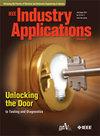A Direct Search Nelder Mead MPPT Based Induction Motor Drive for Solar PV Water Pumping System
IF 4.2
2区 工程技术
Q2 ENGINEERING, ELECTRICAL & ELECTRONIC
引用次数: 0
Abstract
This paper introduces a Nelder-Mead (NM) optimization approach for maximum power point tracking (MPPT) in solar photovoltaic water pumping systems (WPS). The NM method comprises four main operations, namely reflection, expansion, contraction, and shrinkage. These operations assist all particles rapidly converge toward a global maximum power point (GMPP) with negligible steady-state oscillation. A water pumping system, integrated with an induction motor drive, is operated through a scalar control method employing a three-phase voltage source inverter. To regulate the DC-link voltage, a robust control method, specifically the integral sliding mode controller (ISMC), is proposed. Furthermore, a smooth function is introduced to address the concern of chattering magnitude associated with the ISMC. The proposed system is both modeled and simulated using MATLAB followed by experimental validation. Additionally, the effectiveness of the algorithm is confirmed through comparisons with conventional methods. The proposed NM algorithm demonstrates a convergence efficiency of 99.85%, with an average tracking time of 0.23 s. The introduced control methods contribute to improvement in system performance, particularly under dynamic shading conditions.求助全文
约1分钟内获得全文
求助全文
来源期刊

IEEE Transactions on Industry Applications
工程技术-工程:电子与电气
CiteScore
9.90
自引率
9.10%
发文量
747
审稿时长
3.3 months
期刊介绍:
The scope of the IEEE Transactions on Industry Applications includes all scope items of the IEEE Industry Applications Society, that is, the advancement of the theory and practice of electrical and electronic engineering in the development, design, manufacture, and application of electrical systems, apparatus, devices, and controls to the processes and equipment of industry and commerce; the promotion of safe, reliable, and economic installations; industry leadership in energy conservation and environmental, health, and safety issues; the creation of voluntary engineering standards and recommended practices; and the professional development of its membership.
 求助内容:
求助内容: 应助结果提醒方式:
应助结果提醒方式:


